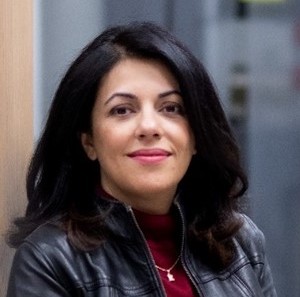Register for Elham Sahraei’s April 7 seminar
 The ECS Detroit Section invites you to “Detecting Internal Short Circuit in Li-ion Cells with Sahraei Failure Model” on April 7, presented by Elham Sahraei, Professor and Director of the Electric Vehicle Safety Lab, Temple University, at Mercedes-Benz Research & Development North America, Inc.
The ECS Detroit Section invites you to “Detecting Internal Short Circuit in Li-ion Cells with Sahraei Failure Model” on April 7, presented by Elham Sahraei, Professor and Director of the Electric Vehicle Safety Lab, Temple University, at Mercedes-Benz Research & Development North America, Inc.
Pre-registration required by Sunday, April 6, 2025
Event Information
Title: “Detecting Internal Short Circuit in Li-ion Cells with Sahraei Failure Model”
Date: Monday, April 7, 2025
Schedule: 1800h Posters & Dinner | 1900h Speaker
Location: Mercedes-Benz Research & Development North America, Inc.
35555 W. 12 Mile Road, Farmington Hills, MI 48331-3139
Fees: Registration includes dinner.
Professionals: USD $20
Student presenters: USD $0
Student non-presenters: USD $10
Registration deadline: Sunday, April 6, 2025*
*Pre-registration required
Student Posters
We encourage students to submit posters as up to three will be presented at this event. The first three students to email us at ecs.detroit.rsvp@gmail.com about presenting their work receive one year of free access to ECS Detroit Section events.
Abstract
Safety is a major concern for Li-ion batteries in electric vehicles (EVs) in the event of road crashes. The internal fracture of a battery cell may lead to a short circuit and, in extreme cases, cause thermal runaway and explosion. Consequently, heavy protective structures are used around EV battery packs to prevent deformation during a vehicle crash. Developing a universal failure model for battery short circuits can enable better prediction of imminent safety concerns and provide a tool for designing optimized protective structures. A failure and short circuit model, titled the “Sahraei Failure Criterion,” has been developed. This model is derived from simulations of the microstructure of the electrode-separator assembly and is then employed to predict cell failures in both cylindrical and pouch cells. The failure model, in combination with a homogenized cell model, is validated in predicting all major loading scenarios, including local hemispherical punch and rod indentations, three-point bending, and in-plane loading. The model defines in-plane tensile failure strain values as a function of the ratio of through-thickness compressive strain to in-plane tensile strain. This universal failure model predicts the onset of internal fracture of the jellyroll under all available types of loading using a single calibrated input curve. The model has been implemented in two commercial software packages: Ansys LS-Dyna and Altair Radioss.
Elham Sahraei
Elham Sahraei is Associate Professor and Director of the Electric Vehicle Safety Lab (EVSL) in Temple University’s Department of Mechanical Engineering. Her research focuses on the mechanical safety of lithium-ion batteries under extreme loading conditions. She developed the Sahraei Failure Model, the first of its kind capable of detecting internal short circuits in lithium-ion batteries. It has been implemented in commercial FE software such as LS-Dyna and Radioss. In addition to lithium-ion battery characterization and modeling, her expertise includes full-scale vehicle crash analysis, occupant protection, and the analysis of roadside safety structures. In September 2024, she founded the Center for Battery Safety (CBS) to develop experimental and simulation tools for battery characterization and modeling. The automotive industry, their suppliers, FE software companies, Pennsylvania State programs, and the Office of Naval Research sponsored Prof. Sahraei’s recent work.
Before joining Temple, Prof. Sahraei was a Research Scientist at the Impact and Crashworthiness Lab of the Massachusetts Institute of Technology (MIT). She served as Co-Director of the MIT Battery Consortium from 2011 to 2019. She earned her PhD from The George Washington University, MS from the Sharif University of Technology, and BSc from the Isfahan University of Technology. Prof. Sahraei served as session chair and organizer for numerous battery safety-related conferences and seminars. Her high-impact research and publications in the field have been recognized by The American Society of Mechanical Engineers (ASME) Obert Award and SAE Myers Award, and organizations including the Stapp Association and WES.
Questions
Contact ecs.detroit.rsvp@gmail.com.
ECS Sections
ECS sections introduce and support activities in electrochemistry and solid state science within specific regions. Members have opportunities to engage and expand their professional networks. Not a section member? Email customerservice@electrochem.org now to join your region’s ECS section.

